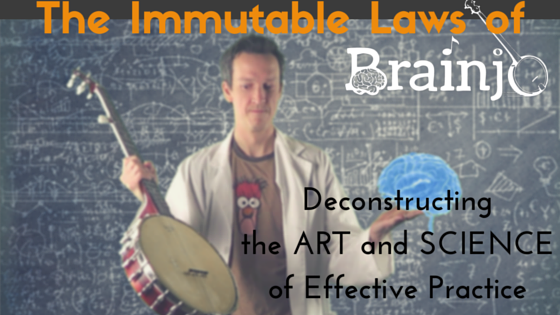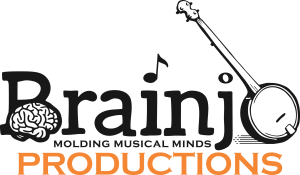Episode 27: 3 Reasons Why Playing Banjo Is Great For Your Brain
Over the years in my work as a clinical neurologist, I’ve often been asked the question: “what should I do to keep my brain in shape, to help protect me from getting something like Alzheimer’s?” Since one my areas of expertise is diseases of cognition – those that affect our ability to do things like speak, learn, remember, and solve problems – it’s a question I’ve been asked a great many times. “Learn a musical instrument or a new language,” has been my typical reply. Most are surprised by that answer, having expected me to direct them to the latest online “brain training” program, or to the latest and greatest supplement being hawked on late night infomercials, or perhaps encourage them to take up crossword puzzles. Yet, there’s little doubt in my mind that learning to play a musical instrument ranks near or at the top of the list of brain building activities, certainly far surpassing any of the aforementioned contenders. And that, of course, includes learning to play the banjo. In fact, for reasons I’ll explain below, it is ESPECIALLY true of the banjo. Reason #1: It’s a “game level” intervention. One way of categorizing any sort of treatment or therapy we might employ in the name of better health is by the level at which it acts. The highest level of intervention would be at the level of human behavior. And just as it’s far easier to win at Angry Birds by playing the actual game than it is to win by manipulating its source code in real-time, game level health interventions are almost always more powerful, and much less likely to crash the system. This is why the health benefits from things like changing one’s diet or exercising regularly far eclipse anything that modern medicines, which operate far downstream in the biological cascade, have to offer. Though in this pharmaceutical-loving era of ours we may try to convince ourselves otherwise, we truly have no idea how to predict the full spectrum of consequences when we monkey with our source code. This is a lesson we’ve learned more times than we can count. So rather than a drug we might take to boost cognitive function, which acts crudely on a single restricted domain of an incredibly complex regulatory system, with remote effects and potential risks we’re not smart enough to predict, learning an instrument acts at the top-most “game” level, influencing the entire system in ways that support and amplify its own finely honed systems for maintaining good health. Reason #2: It’s one of the most cognitively demanding tasks humans engage in. In a prior “Your Brain on Banjo” article I summarized all the various cognitive networks involved in musical performance, in particular the ones engaged in a typical jamming situation. The computational resources necessary to successfully pull off such a feat are immense, and if we measure activities that build brains in the same manner as we do those that build bodies – by total work load – then we’d be hard pressed to find its equal. Generally speaking, the harder you work the brain, the bigger it grows. Cognitively demanding exercises build synapses, and stimulate the birth of new brain cells. Playing music literally grows brains. And while we can’t be certain of the direction the arrow of causation points here, I think it’s no coincidence that so many of our greatest scientists and mathematicians have also been musicians. The research in the area also indicates that the brain-building properties of musicianship are protective. The bigger your brain, the richer the connectivity, the more protection afforded against the ravages of aging and degenerative diseases. Reason #3: It connects us. Most of us drastically underestimate the importance of human connection to health. But the research is abundantly clear on the issue. Loneliness and social isolation negatively impact health, down to the level of the cell. Yet, one of the ironies of this age of communication and “connectivity” is that, in many ways, we’re more disconnected from each other than ever before (no, Facebook friends don’t count here). Pick up the banjo, though, and you’re instantly part of a worldwide community of musicians and music lovers. You’re now a member of the 5-string tribe, one that engages in a sacred ritual where people of all abilities come together to share their music. They come together to connect over an act so fundamental to the human experience that it’s found in every culture across the globe: gathering together for song and dance. What exactly does this do for your brain? Loneliness and social isolation, or the lack of connections with other humans, has repeatedly been shown to increase the risk of cognitive decline, increase the production of hormones linked to brain shrinkage and a heightened risk of Alzheimer’s, and suppress the birth of new brain cells. In short, from the brain’s perspective, nothing good comes from it. By contrast, those who feel well supported and who are socially connected have bigger brains, and maintain their cognitive faculties for longer. Being part of a tribe nourishes and protects the brain. So there you have it! 3 great reasons why, if hanging onto your marbles for as long as possible is a priority, then pickin‘ the five is your best medicine. To learn more about the Breakthrough Banjo courses for clawhammer and fingerstyle banjo, click the relevant link below: — Breakthrough Banjo for CLAWHAMMER Banjo —
— Breakthrough Banjo for FINGERSTYLE Banjo —
— The Laws of Brainjo Table of Contents —
View the Brainjo Course Catalog

